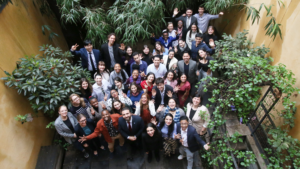 In analysing structural functionalism, or how social structures give shape to our lives, families come first in the hierarchy of socialization agents because family is where we all have our beginnings from the moment of conception. The struggling and caring nature of mankind has its roots in family; without human families, societies cease to exist and human species become subject to extinction.
In analysing structural functionalism, or how social structures give shape to our lives, families come first in the hierarchy of socialization agents because family is where we all have our beginnings from the moment of conception. The struggling and caring nature of mankind has its roots in family; without human families, societies cease to exist and human species become subject to extinction.
The Ideal Family
Dalai Lama’s Global family is Utopian but not a mirage. The Global family is realistic and can be actualized by the creation of ideal families. An ideal family is founded on True Love and bound by Truth.
True love is unconditional and yields understanding of our surroundings, of other people, and how they react in different circumstances. It is not about being hypersensitive to people or happenings around us. The Family as the garden of love is an epitome of a perfect loving society offering a perfect setting for nurturing love in the world. True love is also characterised by mutual respect, mutual reciprocity and moral responsibilities. In other words, true love demands that we live for the sake of others in the spirit of solidarity. It’s about putting other’s needs above our own. Treating ourselves as worthwhile will help us feel worthwhile.
True love is not based on competition. Patriarchal societies are characterised by male chauvinism. As a result, we have societies where people are violent and disrespectful because it is masculine to be aggressive. Masculinity is for protecting the family, not intimidating the family; it’s for engaging in cumbersome tasks that build homes and society. Feelings of superiority sets people against each other in contest based on egocentricism. The culture of humility can only be embedded in our societies when we teach our children the concept of equality in diversity.
True love demands that we spend our family time together. Most families don’t spend quality time together. We have been carried away with our electric devices that we rarely have time for each other. Technology is good, but it may also weaken our family ties if left unchecked. Weak families weaken the social fabric hence a loosely structured social system. Family members are best friends that spend quality time through cultural enrichment and entertainments that revitalize our energies such as dancing, arts, enjoying music together, and playing. Spending time together makes us feel we are part of the family and not apart from the family. Bonding gives us reasons to express our gratitude and opportunities to appreciate each other in society and express what lies in the innermost chambers of our minds.
Truth sets us free – our freedom is based on truth. Families that promote freedom don’t control their relationships, they influence them. As Hazelden Foundation puts it, compulsions and pressures for conformity stifle our creativity and erode our dignity. When families master St. Thomas Aquinas’ art of freedom for excellence, the world will never be the same.
Ideal families don’t always have smooth relations. Even roses have thorns; differences between people just don’t go away so we are likely to end up in confrontations occasionally that manifest themselves through feelings that generate quarrels and disagreements, hostility, envy, self centeredness, ingratitude, and depression. The problem is not the conflicts, the art of living is in how we respond to our problems. Do we react in a scary and destructive way by yelling or bursting out to our family members whenever we feel cross? We rise above indecency when we express anger in an honest, direct, and respectful manner, when we accept our imperfections, the imperfections of family members, the imperfections of others in society, and strive towards perfections by pulling together. Truth as the fact checker must be considered first in finding solutions to existing problems. And to face the truth, we must have the courage to know its pain, for truth is bitter-sweet. Charles Malik argues that the realization of objective value through true subjective value is possible because objective value helps us to discern truth hence rationality. Therefore, mutual subjectivity is about objectively affirming each other.
Written by Dannis Ogola, WYA Africa Batch 1 2018 intern alumnus







